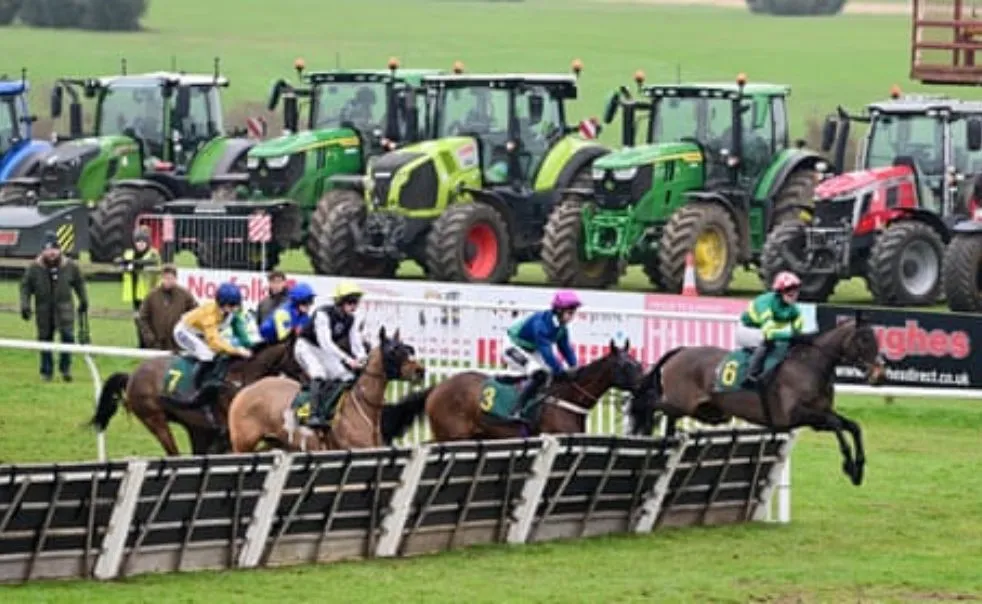Horse Racing’s Role in Betting Affordability Checks

Elle
Jan 23rd 2025
Likes
Share:
A recent protest at Fakenham Racecourse on Sunday, where tractors were parked across the track during a seven-race card, has sparked conversations about the role of horse racing in the ongoing debate over betting affordability checks. The protest, organized by Fakenham racecourse’s chief executive David Hunter, aimed to draw attention to the concerns of the rural community regarding a proposed inheritance tax policy. Around 50 tractors participated, aligning with Hunter’s effort to highlight the struggles of rural businesses and communities, particularly those affected by the farm inheritance tax.
Hunter initially hoped for a larger turnout of tractors to fill the infield, but the sight of the vehicles on the track caught the attention of both media and political figures. George Freeman, the Member of Parliament for mid-Norfolk, referred to the protest as part of a “rural revolt,” which could include both farming and rural service economies, with racing playing an important role. Freeman argued that if racing aligned with farming and rural businesses, they could collectively influence the government’s stance on the issue.
Freeman also linked the protest to the betting affordability checks, suggesting that racing’s involvement in this debate is part of a larger effort to protect rural communities and the countryside. The introduction of betting affordability checks has caused concern within racing, with many figures in the sport fearing the financial consequences these regulations could bring.
However, critics argue that linking betting affordability checks with rural issues may be an overstatement. While it is true that betting affordability checks could affect betting revenues, racing has previously been involved in causes that later turned out to be less impactful than anticipated. One example is the opposition to the Hunting With Dogs Act of 2004, where fears were raised that a ban on fox hunting would eventually lead to a ban on jump racing. These predictions proved false.
Similarly, racing was drawn into the debate over restricting stakes on £100-a-spin gaming machines, with warnings that such changes would result in widespread closures of betting shops and harm the sport’s finances. In hindsight, these fears did not materialize as expected.
Today, racing faces another challenge linked to betting regulations, particularly concerning the introduction of betting affordability checks. These checks, as outlined in a White Paper published in April 2023, aim to assess the financial risk of gamblers in order to prevent the impact of gambling checks. The proposals of the Gambling Commission have put the racing world on high alert as the leaders of the industry are worried about the effect on the bookmakers’ turnover, thus affecting the overall financial stability of racing. These checks are about to start with a pilot program in 2024.
It is important to note that the betting affordability checks, as they are currently structured, have not yet been fully implemented. The pilot program will conclude next month, and it is expected that only a small fraction of affected customers will even be aware that a check is taking place. This suggests that concerns within racing may stem from the larger number of checks already being imposed by gambling operators, which have often been more intrusive than necessary.
These operators have been conducting their own betting affordability checks, often using undisclosed criteria. Many punters have reported frustrations with these checks, which have led to altered betting habits. The concern is that these checks, which were meant to target high-risk gamblers, may discourage casual bettors, negatively affecting the revenue that supports racing.
There are also concerns that the thresholds for betting affordability checks designed for high-risk gamblers in the slot and casino markets might not suit the betting patterns found in sports, where the risk of problem impact of gambling checks is generally lower. Racing advocates argue that the Gambling Commission should apply different criteria for sports betting to prevent unnecessary disruptions to the sport’s finances.
The impact of gambling checks addiction cannot be taken lightly, still, we must realize that we are dealing with a serious issue that needs our full attention. The entire gambling industry must implement measures that are pro-health, but the regulations need to be clear enough and be pertinent to the different types of impact of gambling checks in each location. Sports betting, with its relatively lower risks, requires a different approach than high-stakes gambling products.
While the rural protest at Fakenham racecourse highlighted real concerns about rural businesses and communities, it also brought attention to the ongoing debate over betting affordability checks. Whether racing should be part of this broader political fight remains unclear, but it is evident that the sport needs to consider carefully its involvement in these discussions. Racing must work alongside other sectors to ensure that any new regulations are fair and appropriate for the unique nature of sports betting.
